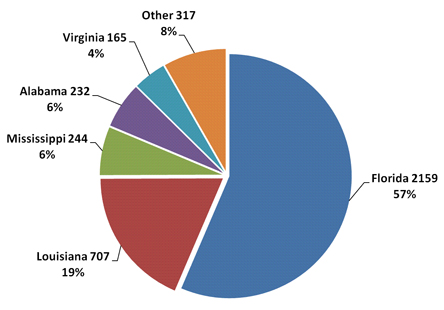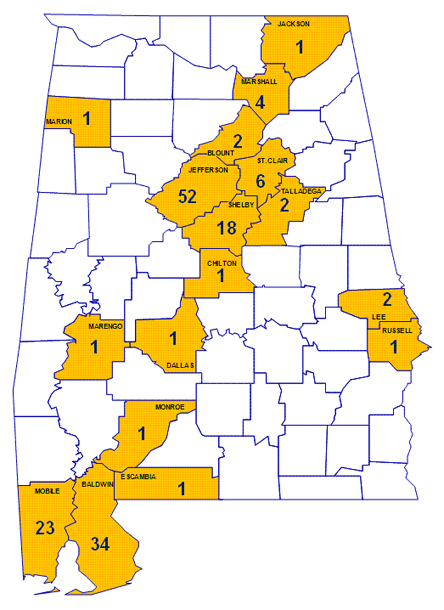Drywall Advisories
Background
The hurricane seasons of 2004 and 2005 in the Gulf of Mexico and the Atlantic oceans caused severe property damage and lead to a shortage of domestic supplies of drywall. As a result, drywall was imported from foreign sources, notably China, and reportedly used in homes built between 2006 and 2008. The drywall imported from China (550 million pounds; enough for 60,000 homes) has come under scrutiny as the source of corrosive gases that corrode copper and other metals within homes built with this material. There are also reports of potential health effects from residents of these homes.
The U.S. Consumer Product Safety Commission (CPSC) has, as of March 14, 2011, received 3810 reports from residents in 42 states, the District of Columbia, American Samoa, and Puerto Rico concerning these issues. The five most affected states are Florida, Louisiana, Mississippi, Alabama and Virginia.
Number and Percentage of Drywall Incident Reports by State 
Source: CPSC Drywall Information Center
Locations Where Chinese Drywall Has Been Verified in Alabama
As of 03/23/2011

What Is Being Reported
Most reports to the CPSC contain the following:
1. Health Effects
The most common health effects reported are:
- A "rotten egg" smell
- Irritated and itchy eyes
- Irritated skin
- Difficulty in breathing
- Persistent cough
- Bloody noses
- Recurrent headaches
- Sinus infection
- Asthma attacks
2. Building Effects
- Blackened and corroded metal components
- Frequent replacement of air conditioning parts and electrical appliances
What Can Affected Residents Do
The first thing that residents should do is file a consumer complaint.
There is Internal Revenue Service (IRS) and Alabama Department of Revenue tax relief available. The Alabama Department of Revenue routinely follows Federal tax allowances concerning Casualty Loss. Contact the Department of Revenue at (334) 242-1170 and follow the phone prompts to determine if you qualify.
There is a wealth of information available at the following websites:
- Drywall Information Center (CPSC)
- Centers for Disease Control and Prevention's Response to Problem Drywall
- HUD and CPSC Issue Guidance on Repairing Homes With Problem Drywall
- Florida Department of Health
If residents are thinking of seeking out professional assistance, a review of these sites may be of assistance:
Questions?
Contact the Alabama Department of Public Health Indoor Air Quality or the Toxicology Program.
Page last updated: February 10, 2026




